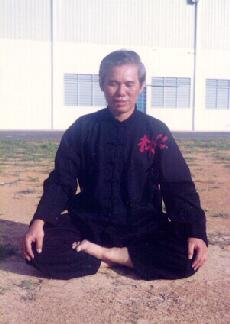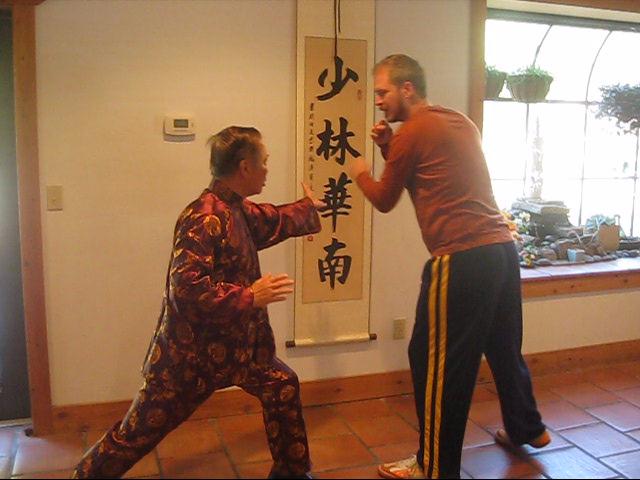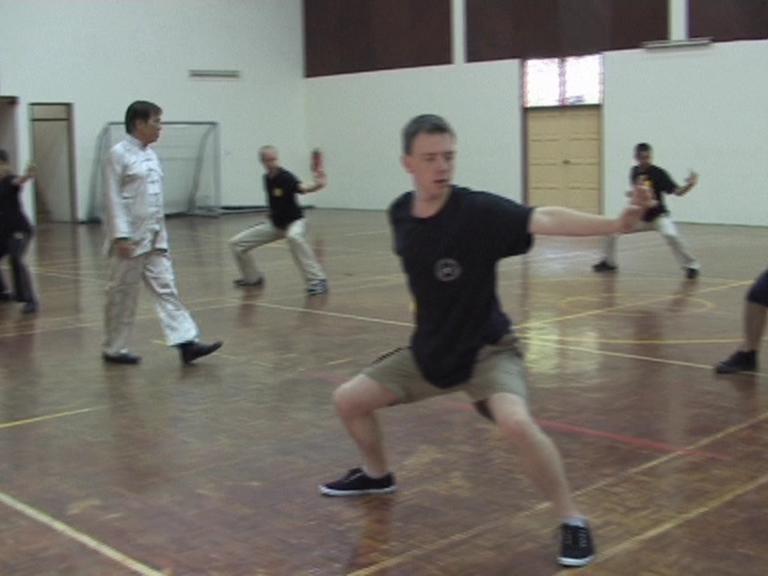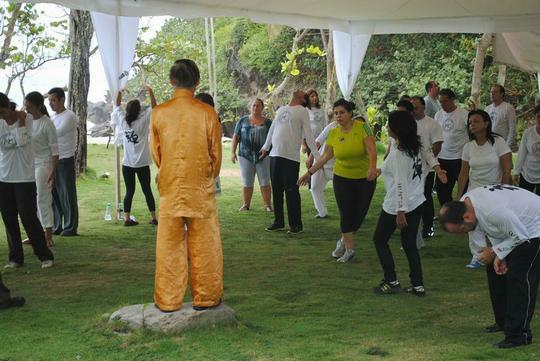SELECTION OF QUESTIONS AND ANSWERS
AUGUST 2012 PART 1

Doing Nothing and Thinking of Nothing
Question 1
Dear Sigung,
What were the views of kungfu masters in the past on Cosmic Reality and how did they cultivate to attain it?
— Sifu Jose Antonio, Ecuador
Answer
Kungfu masters in the past normally did not talk about Cosmic Reality. Kungfu practitioners did not normally practice spiritual cultivation. They did not even practice kungfu for health, vitality and longevity the way we do in Shaolin Wahnam.
This may be a surprise to many of our Shaolin Wahnam students, because although we place much importance on combat efficiency, we place higher priority on good health, vitality, longevity, moral living and spiritual cultivation. The following explanation will make this clear.
In the past, kungfu practitioners practiced kungfu chiefly for combat, and their combat efficiency was very high compared to that of present day kungfu practitioners. Indeed, most people who practice kungfu today are unable to apply their kungfu for combat!
Hence, past kungfu practitioners, with the exception of very high-level masters, seldom talked about or practiced spiritual cultivation. The main method of the very high-level masters for spiritual cultivation was meditation. Traditionally, meditation was taught to kungfu practitioners only when they had attained very advanced levels. Moreover, meditation for spiritual development was normally the preoccupation of Buddhist monks and Taoist priests in monastic environment, not of kungfu masters in lay life.
Hence, we in Shaolin Wahnam are very special in this respect. Not only we understand and practice spiritual cultivation, we do so right at the beginning and without the necessity of becoming monks or priests.
The vocabulary used to describe spiritual attainment was quite different, though the essence was the same. Monks and priests, as well as high-level kungfu masters did not talk about Cosmic Reality, they talked about attaining Zen or attaining Tao. Unless they had actual experience of spiritual awakening or satori, their intellectual understanding of Zen or Tao, which we call Cosmic Reality, might not be as clear as our students' understanding. As often is the case, other people may accuse us for being arrogant or boastful, but I honestly believe this is true. I must emphasize that this is no slight on the past masters. Their intellectual understanding might be less than ours, but their practical attainment was more.
This is the same in kungfu as in spiritual cultivation. Past kungfu masters did not have as much intellectual knowledge as we in Shaolin Wahnam do today, but their practical attainment was higher. For example, past masters did not know as many methods of internal force training or how internal force was developed as we know, but they had more internal force than we have.
To return to the question, the answer is that the views of Cosmic Reality of past kungfu masters were very different form ours. They did not use the term "Cosmic Reality"; they called it "Zen" or "Tao". They did not have a clear intellectual understanding of Zen or Tao, or what we call Cosmic Reality, because Zen cultivation or Tao cultivation was normally not part of their training; these were the special training of Buddhist monks and Taoist priests.
Our understanding of both the meaning of Zen or Tao, as well as the training methods to attain them, is more than that of past kungfu masters. We know, for example, that Zen or Tao or Cosmic Reality is infinite, eternal, omnipotent, omnipresent, all powerful, and undifferentiated, what Buddhist masters refer to as Emptiness, what Taoist masters refer to as the Great Void, what Westerners refer to as God the Holy Spirit, and what modern scientists refer to as the undifferentiated universal spread of energy. Past kungfu masters did not have such knowledge.
We also know, at least intellectually, many training methods to attain Cosmic Reality -- when we are ready and if we want to. We know that the approach is training of mind, also called spirit, soul or consciousness, which is poorly translated in Western terms as meditation. We also know that meditation or mind training can be practiced not just in a seated lotus position but in any posture, including standing and moving about. Past kungfu masters might not know this.
Question 2
What were the views of Sitaigung Ho Fatt Nam on Cosmic Reality? What were the topics or concepts you had with him? What were the methods you learned from him for spiritual cultivation?
Answer
My sifu, Sifu Ho Fatt Nam, did not use the term "Cosmic Reality"; he used "Zen" and sometimes "Tao", but the essence is the same. The term "Cosmic Reality" was first used by me to enable Western educated persons to understand the concept better.
My sifu also did not teach me Zen or Tao formally, though he himself was a great Zen and Taoist grandmaster. This was because I went to him for kungfu training, and not for Zen or Tao training. Nevertheless, I learned and benefited a lot from him informally in Zen and Tao cultivation. Such informal lessons were mainly from examples of his daily living as well as conversations over tea or meals.
For example, and this actually happened, when he found that my kungfu movements were staccato, he did not give a long discourse on how and why kungfu movements should be flowing, he just told me to perform the patterns in a sequence instead of individually. When he found I lacked force in my punches, he did not explain different ways of force training, he just told me to practice "Thirty Punches" using stone-locks. His instructions were simple, direct and effective -- the hallmarks of Zen.
My sifu and I did not talk about Zen or Tao; we practiced it. For example, we did not discuss the concept of non-thought, but he taught me to be relaxed and to clear my mind of all thoughts in my kungfu and chi kung training. He did not philosophize on the importance of morality, but demonstrated high moral values in his daily living.
The main method for spiritual cultivation he taught me was bafflingly simple. He just told me to sit silently in a lotus position, do nothing and think of nothing. He did not even demonstrate the method to me; he just described it. He also did not say it was for spiritual cultivation. But as a good student, I followed his instruction faithfully. It was many years later that I had my first spiritual awakening.
By comparison students today in Shaolin Wahnam are extremely lucky. They have proven, effective methods systematically taught to them. They know exactly what they are doing and what attainments they can expect to have. In the recent Intensive Chi Kung Course (8th to 12th October 2011) in Sabah, for example, more than 60% of the class of 38 people experienced their spirit expanding beyond their physical body. It was simply incredible but true that they achieved in a few days what it took me many years to achieve!

Skills like good spacing and good timing have to be learnt from a competent teacher
Question 3
Can you please tell me what are the best books to learn from that Sifu Wong has written, should I desire to learn kung fu, chi kung,and Tai Chi Chuan? Are there any good pictures, illustrations, as well as easy to follow written instructions? Where can I look for his books?
— Dan, UK
Answer
Many people have kindly mentioned that "The Art of Chi Kung", "The Art of Shaolin Kung Fu" and "The Complete Book of Tai Chi Chuan" are the best books they have read on chi kung, Shaolin Kungfu and Tai Chi Chuan respectively. These books give a comprehensive, yet in-depth explanation of the arts. They are well illustrated with pictures and the texts are easy and pleasant to read. You should be able to purchase them on line or from good book shops.
Nevertheless, learning from books, even when they are excellently written, is incomparable to learning from competent teachers. Many students who first read my books, then learned personally from me, have told me this fact.
There are many reasons why learning personally from a competent teacher is far superior to learning from books. One very important reason is that books only give you techniques but not skills. In any art, skills are more important than techniques.
For example, you may learn the best soccer techniques from a book, but without the necessary skills you may be unable to kick a ball well. Soccer is a sport where skills are mainly external and visible. Imagine how more crucial it is to learn from a competent teacher in arts like chi kung, Shaolin Kungfu and Tai Chi Chuan where skills are internal and not easily visible.
Question 4
Thanks for your great books and informative webpage. Hopefully, one day I will have the money to attend one of your courses. Now I'm a poor medical student on loans I just try to learn to the best of my ability with your books. But after doing the exercises like "Lifting the Sky" for 5-6 weeks, many of my health problems have miraculously resolved simply by following your directions to the T. I am so grateful.
— Alby, Germany
Answer
I am glad you have found my books and webpages useful. I am more glad that you overcame your health problems by practicing the exercises described in my books. Congratulations.
It is pertinent that you mentioned you followed my instructions to the T. This is important irrespective of whether one learns from books or from living teachers, especially if the student does not have much chi kung experience.
Many students, often unwittingly, practice an art not according to what a master has described but according to what they think it should be practiced. Not only they do not obtain the desired benefits, they may derive adverse side-effects.
I also hope that one day you may attend my chi kung courses. This will be very beneficial to you as a medical doctor. While you have obtained good results by practicing from my books, you will be amazed at the vast difference when you learn from me personally.

A good way to overcome sex urge is to perform a kungfu set
Question 5
I had the opportunity to consult with a very renowned chi kung master a while back as I was dealing with some health problems. He gave me a few answers, but due to the language barrier, I couldn't ask him to elaborate. I was wondering if you can offer your wisdom to me to clarify some of his answers, and tell me if you agree with him.
I'm celibate due to personal conviction. For awhile -- in my poor judgment -- I got interested in Taoist semen retention, where one clenches the pelvic floor muscles just before ejaculation. The results were very bad, and it worsened my health.
The chi kung master told me that this practice was dangerous for a young man like myself, as my lower energy centers were already generating at full force. And he claimed that these practice were suited -- and even then, still possibly dangerous -- for people over 40, whose jing was already waning and needed to conserve or stimulate the lower centers.
Answer
Yes, I agree with the chi kung master. He has given you good advice.
You need not worry about the adverse effects due to your bad practice. If you carry on practicing correctly the chi kung exercises you have learnt from my books, you can overcome your adverse effects and regain good health.
While respecting your personal choice to be celibate, I would like to offer some general comments. To enjoy normal sex is natural. It is actually godly, irrespective of one's religion, otherwise there may not be further generations to continue the religion.
Nevertheless, if you choose to be celibate for some good reason, there are other wiser ways than the semen retention method you used. Despite its possible adverse effects, it is actually not meant for celibacy purpose. It is meant for those, rather selfishly, who wish to have sex but do not wish to release their semen.
As long as there is sexual relationship, irrespective of whether the semen is retained by the method, celibacy is broken. On the other hand, even if semen is released, involuntarily or purposefully induced, celibacy is still maintained if there is no sexual relationship.
A good way to overcome one's sex urge so as to maintain celibacy is to engage in some vigorous exercise, like playing games or performing some kungfu sets. Another good way is to practice some appropriate chi kung exercise, like Lifting the Sky. The resultant chi flow can divert the energy that would otherwise be employed for the sexual act to other parts of the body in a more pleasant way than attempting to retain semen.
Question 6
He said these practices were not Tao. Do you agree with him? And do these semen retention practices have any place in chi kung, or are they considered a deviated practice?
Answer
Yes, I agree with the Taoist chi kung master that these semen retention practices are not in genuine Taoist cultivation. They are deviated practices, though they are found in some schools of chi kung and of Taoism.

Some interesting chi flow during a chi kung class in Venezuala
Question 7
He also told me that as a young man I should build up the middle dan tian and focus less on the lower dan tian, because stimulating the lower centers would cause even more sexual energy? What does he mean? I know that without explicit directions I should not even try his suggestion, but I still am curious why he would suggest this?
Answer
The chi kung master was right. He meant what he said. He was straight-forward; there was no play of words.
The middle dan tian, or the middle energy field, refers to a spot about two or three inches below the naval where the vital energy of a person is naturally located. The energy here is generally used to maintain good health and vitality.
The lower dan tian, or the lower energy field, refers to a spot between your two lower centers, i.e. your anus and your external sex organs. The energy here is generally used for sexual relationships.
A young man like you naturally has a lot of sexual energy at the lower dan tian. If you stimulate this lower dan tian, or your two lower centers, like using the retention method, you may activate your sexual energy making it more difficult for you to maintain celibacy.
On the other hand, if you cultivate your middle dan tian, by practicing appropriate chi kung exercises like Lifting the Sky and Abdominal Breathing, you enhance your vital energy for good health and vitality.
You are wise not to attempt any of these exercises without proper supervision. The chi kung master mentioned all this to help you to be healthy and not to be deviated.
Question 8
My most curious question is this. He said that if I was choosing celibacy, I should do more of my practices and meditations with my eyes open, and to try to sleep less if possible, or at least maintain a proper sleep schedule. He suggests that if I don't do this the liver qi may stagnate and blood may be trapped in the lower centers. What does he mean? Does opening the eyes cause qi to ascend? Does sleep cause the blood to return to the liver?
Answer
Again the chi kung master meant what he said without any play of words. Yes, if all other things were equal, opening the eyes causes qi to ascend, and sleep causes blood to return to the liver.
The chi kung master gave you very good advice according to his assessment of your conditions at the time he saw you.
The master was right in suggesting that if you closed your eyes in meditation, and slept a lot, there would be a bigger chance of your liver qi being stagnate and your blood being trapped in your lower centers. This would affect your health as well as make it more difficult to maintain your celibacy.
Please note that his excellent advice applied to you in your conditions at the time he saw you. Many people who practice celibacy and meditation are also in similar conditions, and therefore his advice is also applicable. However, if you or other people change the conditions, then the advice may no longer be valid. This is an important reason why those who practice internal arts should learn from a competent teacher.
In your case you have changed your condition by practicing chi kung correctly from my books. The changed condition is that you have chi flow from your chi kung practice. Because of this, even if you close your eyes in your meditation or sleep more, your liver chi (qi) will not be stagnate and your blood will not be trapped in your lower centers. The chi flow will also overcome other health problems you may have.
LINKS
Selected Reading
- Zen Buddhism and Spiritual Cultivation
- Good Health is Our Birth-Right
- Iron Wire Force in Healing and Everyday Life
- Energy Different from That of Other Masters
- Spread and Depth of Shaolin Kungfu and Wahnam Taijiquan
